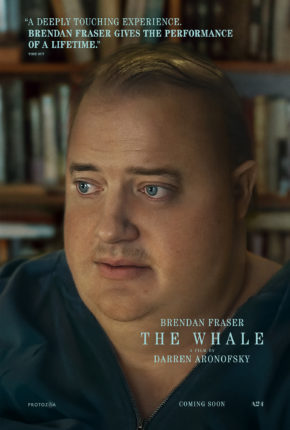
“The Whale” is a film that tells the story of a reclusive English teacher living with severe obesity who attempts to reconnect with his estranged teenage daughter for one last chance at redemption. As you watch the film, we challenge you to spend some time thinking about Charlie’s experience with obesity. Please note that this movie may be challenging for many who live (or love someone) with severe obesity or suffer from binge eating disorder to view. Please take this trigger warning seriously.
Below are several questions for you to consider during and after the film. (Don’t worry, we’ve avoided spoilers in generating this question list).
Obesity and its underlying causes are complex.
- What factors do you think contributed to Charlie’s obesity?
Not everyone responds to stigma and bias the same way. In “The Whale,” Charlie reacts and copes with stigma in various ways. As you watch, consider how your personal views and beliefs, comments and attitudes toward people living with obesity may impact their health and lives.
- What are your views about body weight and size? Have you explicitly or inadvertently contributed to the shaming or blaming of someone based on body size? Have you been on the receiving end of such conduct?
- Did you realize that in most cases, blaming, shaming or making fun of someone because of their size causes significant harm?
- Did you notice Charlie engaging in self-deprecating humor? Why do you think he did that? How would you react if your friend or loved one did something similar? Have you noticed that you use self-deprecating humor to cope with challenging aspects of your life?
Day-to-day functioning (moving, standing and other daily living tasks) can be a significant challenge for some (but not all) people living with severe obesity. Some viewers have criticized the movie for overly focusing on Charlie’s movements and limitations. Still, we’d encourage you to consider some real-world limitations people in larger bodies face.
- Look around your workplace, a local café or even the theater where you saw the film. Would such a place accommodate a person with a larger body? Could that person move through it comfortably? Would there be places they could sit or rest?
Charlie refuses to seek medical care for his obesity, eating disorder and other related health complications. He is not alone. Many people with obesity avoid healthcare because of bias and stigma.
- Why do you think Charlie refused such care? Have you considered that such care would not have been available if he had tried to access the medical care system? For example, do MRIs accommodate a person living with severe obesity? Would a doctor, nurse or other healthcare provider shame or blame him for his health problems?
Charlie lives in a large body; historically, portrayals of people in larger bodies in films have been problematic.
- What were your initial reactions to his body? Did your initial reactions change throughout the film?
- Did you realize that prosthetics were used? Did that impact what you thought or felt about Charlie’s body? Was this movie’s depiction of someone in a larger body different than other movies you’ve seen in the past?
Charlie’s story features the interplay of severe obesity, mental health issues, trauma and eating disorders. But, of course, not everyone with obesity or severe obesity has similar challenges, as this is one man’s story.
- Were you aware of the complex interaction of these issues on Charlie’s life and behaviors?
- Have you ever considered what binge eating behavior looks like? How did the binge scenes in the movie confirm or negate your preconceived notion of binge eating?
Some of the goals of the actors, filmmakers and advisors from OAC were to 1) help people develop a better understanding of the complexity of obesity and 2) to create empathy for people living with obesity.
- Did the movie accomplish these goals? If yes, how and if not, why not?
- Were there any scenes in particular that were difficult for you to watch? If so, why? What made you uncomfortable?
- Do you think you might treat someone in a larger body differently now that you’ve seen the movie?
We hope that OAC members will continue to share their thoughts, views and experiences, both the positive and the difficult, that are sure to be sparked by this movie’s release. For more information on OAC’s involvement in “The Whale,” please click here.
